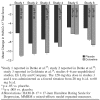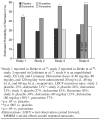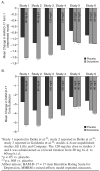Duloxetine: A New Treatment for the Emotional and Physical Symptoms of Depression
- PMID: 15156243
- PMCID: PMC353030
- DOI: 10.4088/pcc.v05n0105
Duloxetine: A New Treatment for the Emotional and Physical Symptoms of Depression
Abstract
BACKGROUND: Depression is underdiagnosed in the primary care setting. Physical symptoms such as aches, pains, and gastrointestinal disturbance are frequently associated with major depressive disorder (MDD) and are often the presenting symptoms. Duloxetine, a dual-reuptake inhibitor of serotonin and norepinephrine, may have a positive effect on physical symptoms in addition to efficacy in treating emotional symptoms of depression. METHOD: Efficacy was evaluated in 6 double-blind, placebo- and/or active comparator-controlled trials of duloxetine for patients with MDD (DSM-IV criteria). Efficacy in depression was determined primarily using the 17-item Hamilton Rating Scale for Depression (HAM-D-17). Secondary efficacy measures included subscales of the HAM-D-17 and assessment of physical symptoms. Safety evaluations included adverse events, vital signs, laboratory analyses, and electrocardiograms. Safety was evaluated by pooling the data from the MDD trials and a study of duloxetine in nondepressed patients. RESULTS: Duloxetine demonstrated significant differences from placebo on core mood symptoms, physical symptoms (e.g., back pain), and global functioning as early as week 1 of treatment. The estimated probabilities of remission in the studies that demonstrated efficacy ranged from 43% to 57%. The most frequently observed adverse events for duloxetine-treated patients included nausea, dizziness, insomnia, fatigue, and somnolence. Duloxetine did not prolong corrected QT intervals, and the rate of sustained elevations of blood pressure did not differ significantly from placebo. CONCLUSION: In these studies, duloxetine was safe and effective in the treatment of both emotional and physical symptoms of MDD. Based on dose assessments, 60 mg q.d. appears to be the optimum starting and therapeutic dose.
Figures





References
-
- Murray CJL, Lopez AD. eds. The Global Burden of Disease. Cambridge, Mass: Harvard University Press. 1996
-
- Greenberg PE, Stiglin LE, and Finkelstein SN. et al. The economic burden of depression in 1990. J Clin Psychiatry. 1993 54:405–419. - PubMed
-
- Musselman DL, Evans DL, Nemeroff CB. The relationship of depression to cardiovascular disease: epidemiology, biology, and treatment. Arch Gen Psychiatry. 1998;55:580–592. - PubMed
-
- Pincus HA, Pettit AR. The societal costs of chronic major depression. J Clin Psychiatry. 2001 62suppl 6. 5–9. - PubMed
-
- Schulz R, Beach SR, and Ives DG. et al. Association between depression and mortality in older adults: the cardiovascular health study. Arch Int Med. 2000 160:1761–1768. - PubMed
LinkOut - more resources
Full Text Sources
Other Literature Sources
